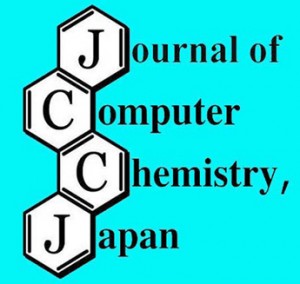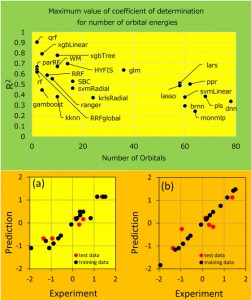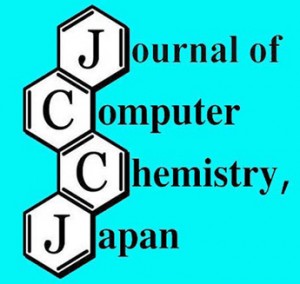[Published online Journal of Computer Chemistry, Japan Vol.22, 41-49, by J-STAGE]
<Title:> スピン反転凍結軌道解析を用いた円錐交差構造の支配因子に関する理論的研究
<Author(s):> 五十幡 康弘, 吉川 武司, 中井 浩巳, 小川 賢太郎, 坂田 健
<Corresponding author E-Mill:> ikabata.yasuhiro.lz(at)tut.jp
<Abstract:> S0/S1極小エネルギー円錐交差(MECI)の支配因子を評価するために,スピン反転時間依存密度汎関数理論に対する凍結軌道解析(FZOA)の波動関数と励起エネルギーを導出した.スピン反転法に特有のスピン汚染を避けるため,定式化においてスピン完全法を適用した.数値計算の結果,「HOMO-LUMO交換積分がほぼ0となる」,「HOMO-LUMOギャップの上限値はHOMO,LUMOが関係するCoulomb積分によって定まる」というS0/S1 MECIの支配因子を発見した.本論文では,FZOAについて概説するとともに,スピン反転法におけるFZOAの定式化について述べる.導出したスピン反転FZOAの式をエチレンとウラシルに適用した結果に基づいて,励起エネルギー成分に基づく支配因子の発見,S0/S1 MECIの電子構造,これらの制限付き開殻法における結合係数への依存性について解説する.
<Keywords:> Conical intersection, Time-dependent density functional theory, Spin-flip method, Frozen orbital analysis, Restricted open-shell method
<URL:> https://www.jstage.jst.go.jp/article/jccj/22/2/22_2023-0021/_article/-char/ja/
<Title:> スピン反転凍結軌道解析を用いた円錐交差構造の支配因子に関する理論的研究
<Author(s):> 五十幡 康弘, 吉川 武司, 中井 浩巳, 小川 賢太郎, 坂田 健
<Corresponding author E-Mill:> ikabata.yasuhiro.lz(at)tut.jp
<Abstract:> S0/S1極小エネルギー円錐交差(MECI)の支配因子を評価するために,スピン反転時間依存密度汎関数理論に対する凍結軌道解析(FZOA)の波動関数と励起エネルギーを導出した.スピン反転法に特有のスピン汚染を避けるため,定式化においてスピン完全法を適用した.数値計算の結果,「HOMO-LUMO交換積分がほぼ0となる」,「HOMO-LUMOギャップの上限値はHOMO,LUMOが関係するCoulomb積分によって定まる」というS0/S1 MECIの支配因子を発見した.本論文では,FZOAについて概説するとともに,スピン反転法におけるFZOAの定式化について述べる.導出したスピン反転FZOAの式をエチレンとウラシルに適用した結果に基づいて,励起エネルギー成分に基づく支配因子の発見,S0/S1 MECIの電子構造,これらの制限付き開殻法における結合係数への依存性について解説する.
<Keywords:> Conical intersection, Time-dependent density functional theory, Spin-flip method, Frozen orbital analysis, Restricted open-shell method
<URL:> https://www.jstage.jst.go.jp/article/jccj/22/2/22_2023-0021/_article/-char/ja/


